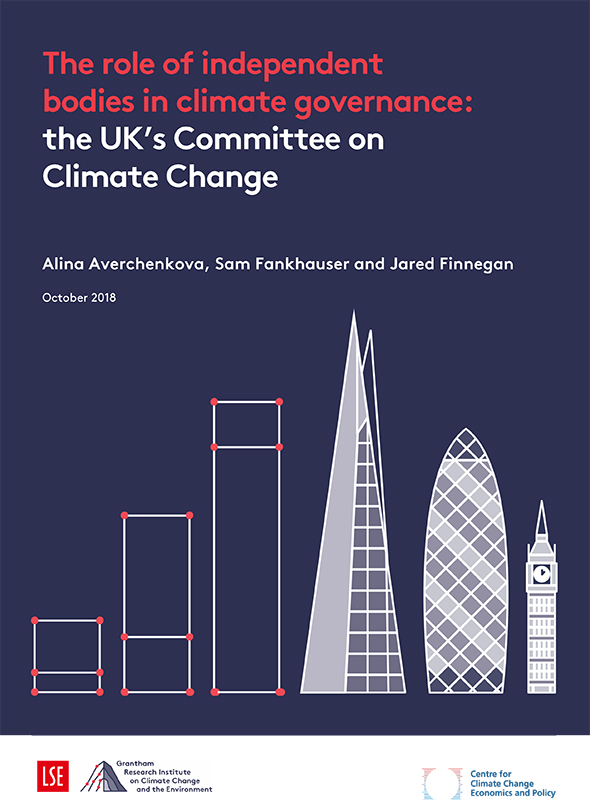How influential is the UK’s Committee on Climate Change?

The Committee on Climate Change is one of the most intriguing features of Britain’s system of climate change governance. Established 10 years ago under the Climate Change Act, the CCC is at the centre of UK climate policy, and in policy circles, if not in the public debate, its analysis defines the discussion: according to UK stakeholders the Grantham Research Institute interviewed for a recent retrospective of the Climate Change Act, the CCC has introduced a long-term perspective into the climate debate, helped to enhance the credibility of climate targets and ensured more evidence-based policymaking.
But how influential has the CCC been in reality? Our new study has analysed Hansard, the official verbatim record of UK parliamentary debate, to answer this question.
Statutory advice generally followed – but with some contestation
Under the Climate Change Act the CCC has specific statutory duties that include advising the Government on carbon targets and climate change risks. This statutory advice has generally been followed, albeit not always to the letter.
At the recommendation of the CCC, the UK has legislated a progressive 2050 emissions target and five carbon budgets that cover the period 2008 to 2032. They require emissions cuts of 57% by 2030, on the way to a reduction of at least 80% by 2050, relative to 1990. Through its Adaptation Sub-Committee (ASC), the CCC has also shaped the debate on climate resilience, for example by providing the evidence base for the 2017 Climate Change Risk Assessment.
A closer look at the parliamentary debates on the five carbon budgets shows that parliamentarians drew extensively on the CCC as their main source of independent information. However, the 2023–27 carbon budget in particular was contested, and Parliament requested an additional review before adopting the CCC’s advice. And in 2016, Parliament ignored the CCC’s advice to include international shipping emissions in the budgets.
Influence that reaches to energy, water, buildings and beyond
The CCC has had impact well beyond its statutory recommendations. Between December 2008 and April 2018, the CCC was mentioned in the debates on 21 new Government bills. Cited 484 times in the House of Commons (plus 372 times in the Lords), the CCC enjoyed almost five times the mentions in the Commons of the Intergovernmental Panel on Climate Change, the most authoritative body on climate change internationally.
Unsurprisingly perhaps, these references were made the most often in the context of four new Energy Bills (debated in 2010, 2011, 2013 and 2016), with references to the CCC in every third sitting. In this context, the CCC was particularly instrumental in bringing about the 2013 Electricity Market Reform, which prepared the ground for decarbonisation of the power sector.
The CCC also featured in the debates on the Infrastructure Bill (2014–15), which assigned the Committee new statutory duties related to unconventional oil and gas (fracking). And parliamentarians referred to the CCC and the ASC during debates on the Water Bill (2013–14), which introduced a new flood reinsurance scheme (Flood Re), the Housing and Planning Bill (2016), which dealt with the energy performance of buildings among other issues, and the Civil Aviation Bill (2012), where aviation emissions were a concern.
For parliamentarians their main use for CCC analysis has been to push for greater ambition – whether on cutting emissions (for example, arguing for tighter energy sector targets) or increasing resilience to climate change (for example, calling for higher flood defence spending).
Not all of the CCC’s recommendations have been followed. Important issues on which the Government has ignored policy advice include buildings emissions and carbon capture and storage. In these areas and others a gap has opened between climate targets and the policies to deliver them, to the extent that the Government runs a tangible risk of a judicial review if it does not follow the CCC’s policy advice more carefully.
Cross-party trust – but more attention from Labour
Most – including all the major – political parties have referred to the CCC and/or ASC in Parliament, with the overwhelming majority of interventions supportive of the CCC and its analysis.
In keeping with their mandate of holding the Government to account, CCC analysis is mentioned especially often – and in fact disproportionately so, relative to their parliamentary strength in the House of Commons – by Opposition politicians, particularly those on the front bench. The Labour Party and (unsurprisingly) the sole representative of the Green Party refer to the CCC most often, relative to their number of seats. The Conservatives have referred to the CCC least often – perhaps because as the party of Government for most of the past 10 years they rely more heavily on official data.
Challenges on the horizon
The CCC has clearly made a material difference to the way climate policy is conducted in terms of objectives (the statutory carbon targets), process (impact on parliamentary debate) and substance (influencing new laws).
This success contains lessons for other countries. Independent bodies such as the CCC clearly have an important role to play in climate change governance. However, to be effective, they must have an appropriate status. This means having a clear statutory mandate, strong leadership, adequate resources, and sufficient powers to hold government to account.
The UK Committee has all these features. However, its success over the past 10 years should not be taken for granted. The next decade will be more difficult than the last, as UK climate policy moves into its next phase and targets are tightened. A strong, trusted and independent CCC will be essential to turning the UK into a climate-resilient, low-carbon economy.
Sam Fankhauser is Director of the Grantham Research Institute on Climate Change and the Environment, and Director of the ESRC-funded Centre for Climate Change Economics and Policy (CCCEP), both at the London School of Economics. He served on the Committee on Climate Change from 2008 to 2016 and on the Adaptation Sub-Committee from 2009 to 2015.

